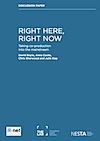Taking co-production into the mainstream
These include, they argue, a tendency to disempower people who are supposed to benefit from services, to create waste by failing to recognise service users’ own strengths and assets, and to engender a culture of dependency that stimulates demand.
People’s needs are better met when they are involved in an equal and reciprocal relationship with professionals and others, working together to get things done. This is the underlying principle of co-production – a transformational approach to delivering services – whose time has now come.
Co-production has the potential to transform public services so that they are better positioned to address these problems and to meet urgent challenges such as public spending cuts, an ageing society, the increasing numbers of those with long-term health conditions and rising public expectations for personalised high quality services.
For over a year, nef and NESTA have been working together to grow a network of co-production practitioners. They have built a substantial body of knowledge about co-production that offers a powerful critique of the current model of public service delivery and a key to transforming it.
The discussion paper Right here, right now – Taking co-production into the mainstream (pdf) is the last of three reports ow is the right time to move co-production out of the margins and into the mainstream. The report provides the basis for a better understanding of how to make this happen.
The first report, The Challenge of Co-production, published in December 2009, explained what co-production is and why it offers the possibility of more effective and efficient public services.
The second report, Public Services Inside Out, published in April, described a co-production framework.




